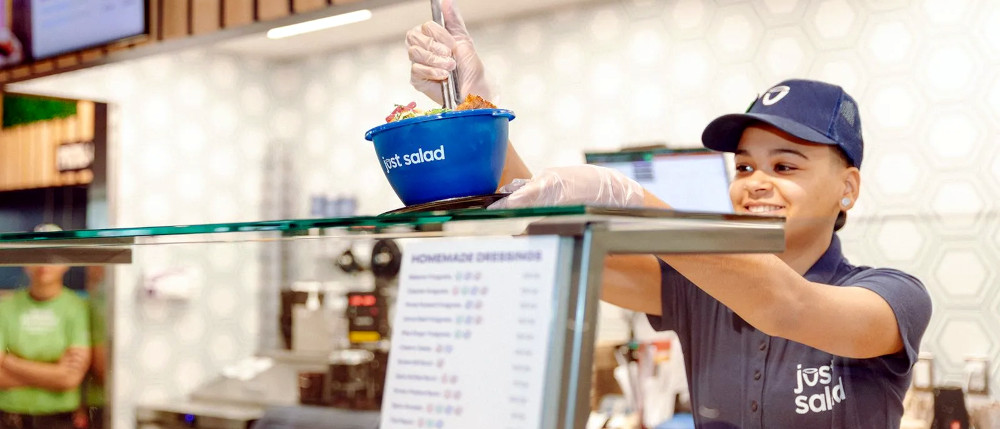Last week at the SB Brand-Led Culture Change conference, a host of brands shared insights into engaging
customers and changing behaviors through circular design and making
energy-efficient choices “normal;” and two new guides aim to equip businesses to
meaningfully address social- and climate-justice issues.
Brands revolutionizing reuse through circular design
 Image credit: Just Salad
Image credit: Just Salad
Moving away from linear, toward circular, design models is critical for a
product to be truly sustainable. In this Thursday morning breakout session,
BBMG, Just Salad,
REI and Target explored the
evolution of designing for circularity-friendly user behaviors. From adopting
reusable containers to emerging e-commerce platforms and creating upcycled
products, these brands have pioneered innovative approaches to cultivating more
sustainable behaviors while cultivating customer loyalty. Throughout the
session, panelists shared strategies to attract new consumers and engage with
current consumers while reducing waste.
BBMG kicked off the session by focusing on the key elements and principles of
circular design, underscoring the importance of making circularity both
enjoyable and accessible to drive lasting behavior change. Founding partner
Raphael Bemporad asked
the audience to consider: “How do we design so every person, product, or
material is utilized?”
Jason Breen, Senior
Director of Target’s Owned Brand Innovation Practice, talked through how the
retailer set a goal to have 100 percent of Target’s owned brands circular by
design by 2040. With a focus on generating joy and ease for its customers,
Target has steadily integrated circular principles into its brand portfolio
through initiatives such as its car seat trading
event, offering
discounts for returning items, and exploring programs such as used shoe
take-backs
have pushed the brand even closer to its goal. And Target’s Universal
Thread clothing line
utilizes digital product passports to educate consumers about sustainability and
incentivize proper end-of-life disposal options.
Laura Kelley — Sr. Manager of
Recommerce at REI — spoke on how the outdoor-apparel brand has been dabbling in
circularity through the reselling of used gear for over 6 decades, starting with
the REI Garage Sale (nka REI
Re/Supply)
in 1962. This initiative aligns with the core principle of keeping products in
use and maximizing their lifespan while also getting the financial benefits of
reselling what could potentially be thrown out. REI invested in this model five
years ago — creating a two-sided marketplace to balance demand and supply —
making it as easy as possible for customers to trade in gear through various
channels including in-person trade-ins, mail-in returns or reselling items in
dedicated resell stores for incentives such as gift cards. Recommerce is now a
critical line of business for REI that also aligns with its commitment to
reducing its carbon footprint, as a significant portion of emissions comes from
the production of new products.
Certified B Corp Just Salad also aims to create an easy process for customers to
embrace circular behaviors. VP of Marketing Jennifer
Lally discussed the
brand’s mission to craft a menu
that is sustainable, regenerative and easy for customers to engage with to make
a positive impact. The fast-casual chain innovates both inside and outside its
stores — implementing initiatives such as carbon labeling its
menu
and partnering with organizations to reduce food waste. Its "Eat. Rinse.
Repeat." model incentivizes customers to buy reusable
bowls for use in-store with a free
topping on purchase day and on every subsequent visit that they bring back their
bowl — thus helping the company to avoid millions of pounds of single-use
packaging annually.
The session ended with attendees brainstorming how Just Salad can encourage its
customers to embrace circularity in their everyday lives — to further drive the
shift towards more conscious lifestyles.
Driving behavioral shifts and transformations that last
 Image credit: Electrolux
Image credit: Electrolux
On Friday afternoon, a panel of marketing communications and sustainability
leaders from globally recognized brands spoke about more ways brand campaigns
and product design are nudging consumers to change behaviors to address the
growing climate crisis — while also being profitable drivers of the business.
Suzanne Shelton, founder/CEO at
Shelton Group, kicked off by asking the panelists why
driving behavior change is an important focus area for Tide
and Electrolux — which have joined
forces
to encourage consumers to use the cold cycle when doing laundry.
Lifecycle assessments have shown that 70 percent of Tide’s carbon footprint is
in the use phase. “We know that by tackling wash temperatures and product use, we
can have a much bigger impact on carbon emissions than anything we’re doing with
our own operations,” said Todd
Cline, Sr. Director of
Sustainability at Procter & Gamble.
Tide’s brand ambition is for 75 percent of all laundry loads to be done using
cold water by 2030. “Ideally, we’d like the entire market to get to 75 percent
of loads or more,” Cline added. “From a science standpoint, it is the biggest
impact we can have.”
Electrolux’s long-term ambition is that its entire value chain is net zero by
2050. Lifecycle assessments have demonstrated that energy usage from the brand’s
washers and dryers is responsible for approximately 85 percent of its climate
impact; so, the company can make its greatest contribution to lowering its
footprint by meeting its product-efficiency goals.
“Our commitment is to make clothes last twice as long with half the
environmental impact,” said Tara
Helms, Director of Sustainability
North America at Electrolux. “We want to elongate the lifetime of those clothes,
and we want consumers to lower their energy usage at home.”
Consumer research has shown that laundry habits are generational: “Most people
wash their laundry the way they were taught,” Helms pointed out. “That is super
important — 80 percent of people use the ‘normal’ cycle setting the majority of
the time.”
Helms shared some of the ways Electrolux’s product designs are incentivizing
desired consumer behaviors using visual cues. The “normal” cycle defaults to
cold water, and a leaf icon appears on the machine when a consumer chooses a
less energy-intensive setting. The more energy efficient the cycle, the more
leaves appear.
She also shared recent brand campaigns that emphasize making more sustainable
choices. The brand’s “Make it
Last” campaign encourages
consumers to “Give your clothes a longer life — for a more sustainable future”
and “Break the Pattern”
highlights the wastefulness of the textile industry and garment graveyards such
as Chile’s Atacama
Desert.
Throughout the conversation, Shelton reminded those in attendance that the
average human does not want to walk around changing their behaviors. “We are not
going to tackle climate change unless people, governments and brands commit to
making changes,” she said.
Pathways to meaningful impact: Navigating social and climate justice in business
 Image credit: Nara & DVIDS Public Domain Archive
Image credit: Nara & DVIDS Public Domain Archive
In these increasingly fraught times, the imperative for businesses to
authentically engage with issues of social and climate justice has never been
clearer. As companies navigate this complex terrain, questions arise regarding
where to start, how to play a meaningful role and how to do it authentically.
Moderated by Annie Longsworth,
Partner — ESG Impact & Value Creation at Shelton Group, this Friday afternoon
workshop unveiled two groundbreaking guides to assist businesses in navigating
this complex space.
Ksenia Benifand, Senior Principal
Change Designer at Forum for the
Future, kicked off
the session by presenting a new
guide,
co-created with B Lab, aimed at enabling organizations to effectively and
holistically address climate- and social-justice issues. Drawing insights from
conversations with over a hundred organizations, activists and individuals with
lived experiences, the Business Guide to Advancing Climate
Justice
highlights the challenges facing businesses in understanding and addressing
climate justice with principles grounded in the experiences of the communities
most affected. By advocating for a systems-change approach and fostering a
mindset shift, the guide urges businesses to recognize their sphere of control
and influence — emphasizing accountability, shared profits and supporting
frontline communities.
Jen Stark, Co-Director of BSR’s
Center for Business & Social
Justice,
then shared her organization’s Social Justice Guide for
Business
— also developed to help Corporate America navigate this evolving landscape. The
guide stresses that social justice encompasses more than just racial concerns
and that many companies have overstepped and
underperformed
in their past responses to social-justice issues. By focusing on US-based,
midsized companies, the guide aims to go beyond preaching to the choir and
encourages practitioners to unpack the meanings behind key concepts including
human
rights
and social justice.
Stark said these approaches are as much about making a business case as it is
future-proofing operations and fostering preparedness, competency and awareness
of blind spots in a rapidly changing socio-political landscape. “Companies need
to do a 360 analysis of themselves and the landscape,” she said. “Think about
cause and effect on how the company can show up.”
Guides such as these not only underscore the urgency of action but also provide
realistic steps for businesses to embed principles of social and environmental
justice into their operations, ultimately empowering them to become agents of
positive change.
Get the latest insights, trends, and innovations to help position yourself at the forefront of sustainable business leadership—delivered straight to your inbox.
Mara Slade is a seasoned communications professional having worked both in-house in sustainability roles and at top creative agencies including Edelman and Digital Kitchen. She has led corporate ESG reporting projects for a variety of Fortune 500 clients ranging from tech, retail, sustainable agriculture, consumer packaged goods, financial services, among others. She is a certified GRI reporter with an MBA from Presidio Graduate School in Sustainable Management.
Impact Manager, Purpose + Sustainability
Formerly working in the advertising world in Kansas City, Hannah Zimmerman has now married her past experience with her passion for sustainability. When she isn't chasing her four-year-old daughter or helping companies along on their sustainability journey through consulting, reporting, communications and certifications, she is working on her master's in Sustainability through Harvard.
Published May 13, 2024 6am EDT / 3am PDT / 11am BST / 12pm CEST